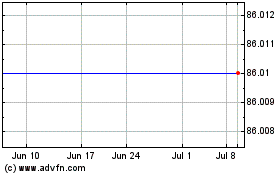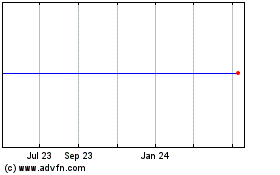Get a Lift With The Elevator Industry -- Heard on the Street
July 01 2019 - 7:15AM
Dow Jones News
By Stephen Wilmot
The elevator industry is on the move, and there's a smart way to
invest in it.
Industrial conglomerates on both sides of the Atlantic -- United
Technologies in the U.S. and Thyssenkrupp in Europe -- are letting
go of their elevator brands in an effort to refocus their corporate
portfolios. The plans have put two cornerstones of an attractive
capital-goods industry in play for the first time in years, likely
opening the door to a deal.
A takeover of Thyssenkrupp Elevators -- a widely rumored target
-- would give the long-suffering shareholders of its namesake
parent company a much-needed lift.
UTC said last November it would distribute or "spin off" to
shareholders shares in its two non-aerospace divisions: Otis, the
world's oldest and largest elevator manufacturer, and
air-conditioning giant Carrier. The spins, which were widely
expected following UTC's $23 billion acquisition of airplane-parts
maker Rockwell Collins, will take place early next year.
Thyssenkrupp's announcement in May that it would pursue an
initial public offering of its elevator business was a bigger
surprise, coming just eight months after the company unveiled a
plan to split itself in two. The change was prompted by the failure
of a project to merge its ailing steel business with that of Indian
conglomerate Tata. When it became clear that the European antitrust
regulators wanted more "remedies" than the deal's economics would
support, the company seems to have settled on the elevator IPO as a
more radical option to unlock the value trapped in its
portfolio.
This could be substantial. Thyssenkrupp Elevators is by far the
company's biggest asset. If it were valued in line with its highly
rated independent peers, Kone of Finland and Schindler of
Switzerland, it would fetch EUR14 billion, according to brokerage
Jefferies. That is almost double the equity value of the
Thyssenkrupp parent, which is admittedly weighed down by big debt
and pension liabilities. How these are allocated will determine the
elevator unit's eventual market value -- if it ever comes to
market.
Thyssenkrupp Elevators could well be sold to a rival before the
IPO. The cost savings achievable in a merger would be substantial,
and the parent company's current board, led by fresh-thinking
chairwoman Martina Merz since February, seems more willing than its
predecessors to contemplate giving up control of the company's
crown jewel.
Kone has long been interested in buying the company and is
working with a bank to explore options, according to a Reuters
report in May. Otis, once independent, is another potential bidder
-- UTC Chief Executive Gregory Hayes has said as much -- but would
face bigger antitrust hurdles than Kone because Otis and
Thyssenkrupp are both dominant in North America. Kone is
underrepresented in North America and strong in China, a weak spot
for Thysssenkrupp.
Investors shouldn't expect an imminent move: To extract the
highest price from any bidder, Thyssenkrupp has every incentive to
pursue the IPO plan for now. Clearing a merger with German labor
unions also seems likely to prove cumbersome. Eventually, however,
the logic of consolidation is likely to prove irresistible.
Even if it doesn't and Thyssenkrupp ends up floating a minority
stake in the elevator unit, the valuation gap with Kone and
Schindler should narrow. With the German conglomerate fetching less
than 13 times forward earnings and Kone almost 27, it is at its
widest point in at least a decade.
Thyssenkrupp's battered stock is the obvious way for investors
to play this story, but Otis and Schindler also could benefit from
a Kone bid. Any transaction will need to satisfy antitrust
authorities by offering assets to rivals.
Making elevators and escalators is an unusually stable business,
with service revenues that protect it from the vagaries of the
boom-and-bust construction industry. Thyssenkrupp gives investors a
cheap way in.
Write to Stephen Wilmot at stephen.wilmot@wsj.com
(END) Dow Jones Newswires
July 01, 2019 07:00 ET (11:00 GMT)
Copyright (c) 2019 Dow Jones & Company, Inc.
United Technologies (NYSE:UTX)
Historical Stock Chart
From Mar 2024 to Apr 2024

United Technologies (NYSE:UTX)
Historical Stock Chart
From Apr 2023 to Apr 2024
